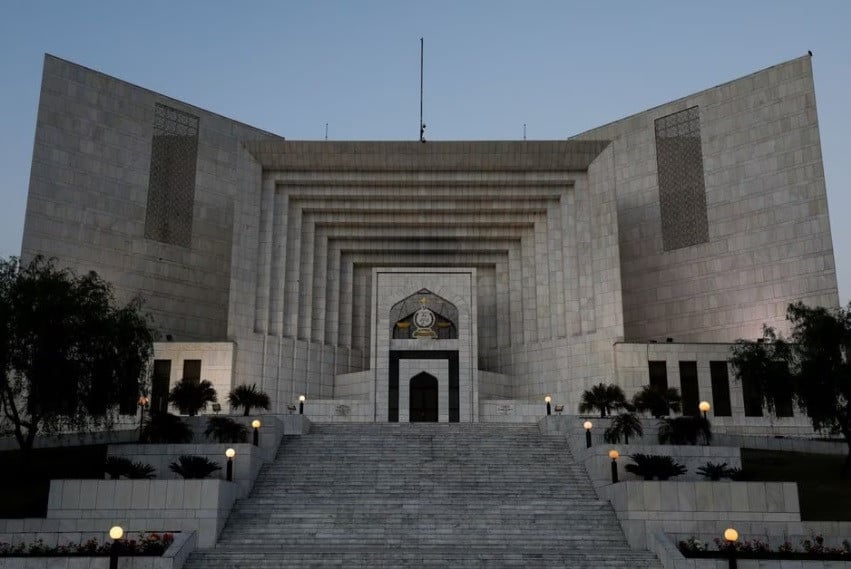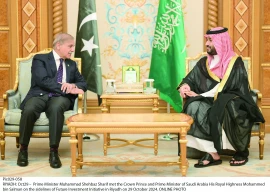
The Supreme Court has held that declaring certain provisions of the Army Act as unconstitutional would not affect the cases of civilians who have already been convicted by military courts.
“Cases of persons convicted by court martial and who have either (i) served out the sentence, or (ii) who are serving the sentence but have exhausted legal remedies and/or whose convictions have otherwise become final, shall be regarded as past and closed, and remain unaffected by this judgment,” reads a 78-page detailed judgment authored by Justice Munib Akhtar against the trials of civilians in military courts.
A five-judge bench of the apex court led by Justice Ijazul Ahsan on Oct 23, 2023 declared that the trials of 103 civilians in military courts were unconstitutional. The bench also held that Clause (d) of subsection (1) of Section 2 of the Army Act [in both of its sub clauses (i) & (ii)] and subsection (4) of Section 59 of the Army Act are ultra vires the Constitution and of no legal effect.
"Although we have made the declaration in para (i) of the short order regarding the vires of the impugned provisions, it must also be recognised that a very great many civilians have been already been convicted and sentenced by courts martial in terms thereof.
“Some regard must be given to this reality and some arrangements made in this regard. Accordingly, it is directed in relation to certain categories of cases as below", says the judgment.
The judgment clarified that the persons, who have been convicted by court martial and who are still pursuing legal remedies (whether statutory or before a court of law) may apply to the appropriate court, which shall consider the lawfulness of the conviction without reference to this judgment, but if it concludes that the person is otherwise entitled to any relief (including, but not limited to, with regard to the sentence) may, in the facts and circumstances of the case before it, also take this judgment into consideration.
The court also said that neither a petition filed under Article 184(3) of the Constitution nor a petition before the president under Article 45 of the Constitution or any provision of law whereby relief equivalent to the latter “can be sought (other legal remedies having been exhausted) shall be regarded as a pending, or (as the case may be) the pursuing of a, legal remedy".
"Any person or class of persons for whom a special remedy has been created by law to a court outside the Army Act or equivalent laws (whether by way of a right of review or re-consideration or otherwise) shall, whether convicted or still being tried by court martial, seek his remedy accordingly, and his case shall remain unaffected by this judgment."
“In view of this clarification, conviction awarded Indian spy Kulbhushan Jadhav will not be affected”.
Justice Ayesha Malik, in her additional note, said that the military trials of civilians on the other hand totally negates the requirement of an independent and impartial judicial forum, hence, it compromises the right to fair trial. Citizens enjoy the protection of fundamental rights under the Constitution and are assured that they will be treated as per law, such that their life and dignity is protected.
"At the same time, the Constitution commands the legislature to not make law which takes away any fundamental right protected under the Constitution. In this context, the requirement of the Federal Government to try civilians before military courts totally defies the constitutional command and is in derogation to the rights contained in Articles 4, 9, 10A, 14 read with Article 175 of the Constitution," said Justice Ayesha.
Unlike the majority opinion, another member of the bench, Justice Yahya Afridi, did not declare certain provisions of the Army Act to try the civilians in military courts as unconstitutional. "While sitting on a bench of five Judges, I am bound by what was decided in F.B. Ali case, wherein, after testing the provisions of sections & (ii) and 59(4) of the Army Act on the touchstone of the fundamental rights agitated before the court in the present cases, the Court adjudged them to be intra vires the Constitution, and not violative of articles 9, 10A, and 25 of the Constitution.”
Justice Afridi did not give definite finding and held that the contentions of the counsel for the petitioners, as to reconsidering the law declared in F.B. All case “is undoubtedly legally and constitutionally very weighty, and thus, make a prima facia case, warranting to be considered and decided by a larger bench of more than eight judges of this court, as was right constituted at the commencement of the proceedings of the present cases”.


1719660634-1/BeFunky-collage-nicole-(1)1719660634-1-165x106.webp)

1732276540-0/kim-(10)1732276540-0-165x106.webp)


1724249382-0/Untitled-(640-x-480-px)1724249382-0-270x192.webp)


1732270499-0/Express-Tribune-(7)1732270499-0-270x192.webp)






COMMENTS
Comments are moderated and generally will be posted if they are on-topic and not abusive.
For more information, please see our Comments FAQ